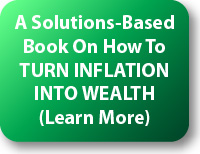Author Information & Course Rationale

Daniel R. Amerman is a Chartered Financial Analyst with MBA and BSBA degrees in finance. He is a financial author and speaker with over 25 years of professional experience. Years of studying the costs of paying for over $100 trillion of US government retirement promises, as well as the costs of cashing out an expected $44 trillion of Boomer pensions and retirement accounts, have convinced him that too many promises and too much paper wealth chasing too few real resources will likely lead to substantial inflation in the years ahead, with potentially devastating implications for many savers and investors. A problem that will also apply to many other nations.
Mr. Amerman spent much of the 1980s as an investment banker helping Savings & Loans and others try to survive the effects of the last major bout of inflation in the United States. There is a basic economics principle that much of the public is unaware of – inflation doesn't directly destroy the real wealth of goods and services, but rather, redistributes the rights to that real wealth (a principle which unfortunately will likely destroy much of the investment wealth the Boomers plan on enjoying in retirement). The author worked with the effects of billions of dollars of such wealth redistributions, and saw how there was not only a loser for each dollar of wealth redistributed – but a winner.
In the free mini-course course Mr. Amerman uses illustrations and examples, contained within a step-by-step sequence of readings, to show people how they can choose to position themselves so that inflation redistributes wealth to them, rather than taking wealth from them. Once the base is established, he then shows in detail how individuals can multiply the underlying economic protection benefits through learning how to realize tax-free (economic) gains, rather than the usual inflation trap of paying real taxes on illusory income.








